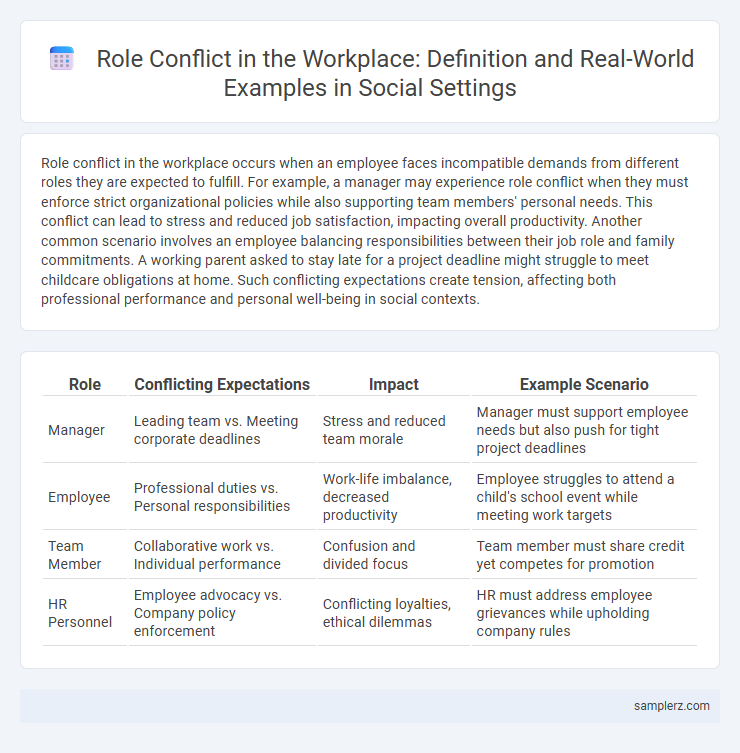Role conflict in the workplace occurs when an employee faces incompatible demands from different roles they are expected to fulfill. For example, a manager may experience role conflict when they must enforce strict organizational policies while also supporting team members' personal needs. This conflict can lead to stress and reduced job satisfaction, impacting overall productivity. Another common scenario involves an employee balancing responsibilities between their job role and family commitments. A working parent asked to stay late for a project deadline might struggle to meet childcare obligations at home. Such conflicting expectations create tension, affecting both professional performance and personal well-being in social contexts.
Table of Comparison
| Role | Conflicting Expectations | Impact | Example Scenario |
|---|---|---|---|
| Manager | Leading team vs. Meeting corporate deadlines | Stress and reduced team morale | Manager must support employee needs but also push for tight project deadlines |
| Employee | Professional duties vs. Personal responsibilities | Work-life imbalance, decreased productivity | Employee struggles to attend a child's school event while meeting work targets |
| Team Member | Collaborative work vs. Individual performance | Confusion and divided focus | Team member must share credit yet competes for promotion |
| HR Personnel | Employee advocacy vs. Company policy enforcement | Conflicting loyalties, ethical dilemmas | HR must address employee grievances while upholding company rules |
Balancing Managerial Duties and Team Friendship
A manager often faces role conflict when striving to balance authoritative decision-making with maintaining close friendships within the team. Navigating performance evaluations while preserving trust and camaraderie requires careful boundary-setting and emotional intelligence. This tension between managerial responsibilities and personal relationships can impact team dynamics and overall productivity.
Navigating Personal Ethics vs. Company Policies
Employees often face role conflict when personal ethics clash with company policies, such as handling confidential information that contradicts personal transparency values. Navigating this tension requires balancing honesty with compliance to maintain professional integrity while respecting corporate guidelines. Effective communication and seeking mediation can help resolve ethical dilemmas without compromising either party's standards.
Parental Responsibilities vs. Overtime Expectations
Employees often face role conflict when parental responsibilities clash with workplace overtime demands, leading to stress and decreased productivity. Balancing late work hours with childcare duties creates tension between professional expectations and family commitments. Organizations implementing flexible scheduling and parental support policies can help mitigate these conflicts and improve employee wellbeing.
Loyalty to Colleagues vs. Loyalty to Organization
Role conflict in the workplace emerges when employees face competing loyalties between supporting colleagues and adhering to organizational policies. For instance, an employee may feel torn between reporting a coworker's misconduct, which upholds company integrity, and protecting that colleague to maintain team trust. This tension highlights the challenge of balancing personal loyalty with professional responsibility, often impacting decision-making and workplace dynamics.
Conflict Between Professional Growth and Team Cooperation
Employees often face role conflict when pursuing individual professional growth while maintaining team cooperation, as ambitions for promotions or skill development may clash with collaborative responsibilities. This tension can lead to reduced team cohesion and increased workplace stress, impacting overall productivity. Organizations must balance support for personal advancement with fostering a cooperative team environment to mitigate such conflicts.
Managing Supervisor vs. Advocate for Employees
A common role conflict in the workplace arises when a manager must balance responsibilities as both a managing supervisor and an advocate for employees, leading to tensions between organizational goals and employee needs. This dual role often forces supervisors to enforce company policies that may negatively impact worker satisfaction, while simultaneously attempting to support and represent employee interests. Effective conflict resolution requires transparent communication, empathetic leadership, and strategies that align management objectives with employee well-being to foster a productive work environment.
Sales Targets vs. Customer Satisfaction
Sales representatives often face role conflict when pressured to meet aggressive sales targets while maintaining high customer satisfaction. Balancing quota-driven objectives with personalized service can create ethical dilemmas and stress, impacting decision-making quality. Organizations must address this tension by aligning performance metrics that reward both sales achievements and positive customer experiences.
Gender Expectations vs. Leadership Roles
Gender expectations often create role conflict in the workplace when women in leadership positions face biases that question their authority or leadership style. Studies show female leaders are frequently challenged to balance traditional societal norms with assertive management behaviors expected in executive roles. This tension can undermine job performance and limit opportunities for career advancement among women in corporate environments.
Peer Relationships vs. Performance Evaluation
In the workplace, role conflict often arises when peer relationships clash with performance evaluation responsibilities, such as a manager needing to provide critical feedback to a close colleague. This tension can lead to stress and reduced objectivity, impacting team dynamics and overall productivity. Navigating this conflict requires balancing empathy with the need for honest assessments to maintain both trust and performance standards.
Diversity Advocacy vs. Traditional Workplace Culture
Employees advocating for diversity initiatives often encounter resistance in traditional workplace cultures that prioritize established norms and homogeneous teams. Role conflict arises when diversity advocates must navigate between promoting inclusive policies and conforming to conventional expectations upheld by management. This tension can impact job satisfaction and organizational commitment, highlighting the need for culturally adaptive leadership strategies.

example of role conflict in workplace Infographic
 samplerz.com
samplerz.com